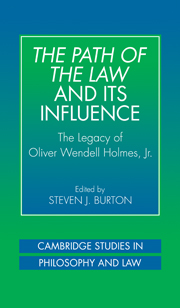Book contents
- Frontmatter
- Contents
- Acknowledgments
- List of Contributors
- The Path of the Law and Its Influence
- Introduction
- 1 Law as a Vocation: Holmes and the Lawyer's Path
- 2 The Bad Man and the Good Lawyer
- 3 Why Practice Needs Ethical Theory: Particularism, Principle, and Bad Behavior
- 4 Theories, Anti-Theories, and Norms: Comment on Nussbaum
- 5 Traversing Holmes's Path toward a Jurisprudence of Logical Form
- 6 Holmes on the Logic of the Law
- 7 Holmes versus Hart: The Bad Man in Legal Theory
- 8 The Bad Man and the Internal Point of View
- 9 Oliver Wendell Holmes, Jr., and William James: The Bad Man and the Moral Life
- 10 Emerson and Holmes: Serene Skeptics
- 11 The Path Dependence of the Law
- 12 Changing the Path of the Law
- 13 Holmes, Economics, and Classical Realism
- 14 Comment on Brian Leiter's “Holmes, Economics, and Classical Realism”
- Appendix: The Path of the Law
- Index
3 - Why Practice Needs Ethical Theory: Particularism, Principle, and Bad Behavior
Published online by Cambridge University Press: 22 October 2009
- Frontmatter
- Contents
- Acknowledgments
- List of Contributors
- The Path of the Law and Its Influence
- Introduction
- 1 Law as a Vocation: Holmes and the Lawyer's Path
- 2 The Bad Man and the Good Lawyer
- 3 Why Practice Needs Ethical Theory: Particularism, Principle, and Bad Behavior
- 4 Theories, Anti-Theories, and Norms: Comment on Nussbaum
- 5 Traversing Holmes's Path toward a Jurisprudence of Logical Form
- 6 Holmes on the Logic of the Law
- 7 Holmes versus Hart: The Bad Man in Legal Theory
- 8 The Bad Man and the Internal Point of View
- 9 Oliver Wendell Holmes, Jr., and William James: The Bad Man and the Moral Life
- 10 Emerson and Holmes: Serene Skeptics
- 11 The Path Dependence of the Law
- 12 Changing the Path of the Law
- 13 Holmes, Economics, and Classical Realism
- 14 Comment on Brian Leiter's “Holmes, Economics, and Classical Realism”
- Appendix: The Path of the Law
- Index
Summary
Innocence is indeed a glorious thing; but, unfortunately, it does not keep very well and is easily led astray. Consequently, even wisdom – which consists more in doing and not doing than in knowing – needs science, not in order to learn from it, but in order that wisdom's precepts may gain acceptance and permanence.… Thus is ordinary human reason forced to go outside its sphere and take a step into the field of practical philosophy, not by any need for speculation (which never befalls such reason so long as it is content to be mere sound reason) but on practical grounds themselves … Thus when ordinary practical reason cultivates itself, there imperceptibly arises in it a dialectic which compels it to seek help in philosophy.
Immanuel Kant, Groundwork for the Metaphysics of MoralsHuman beings, that exceedingly gentle type of being, are not ashamed to revel in the blood of others, to wage war, and to hand on the waging of war to their children, although even dumb and wild beasts keep peace among their own kind. Against this overmastering and widespread madness, philosophy has become more elaborate, and has taken on ambition and force in proportion to the growth in forces on the other side.
Seneca, Moral Epistle 95For the apotheosis of Reason we have substituted that of Instinct; and we call everything instinct which we find in ourselves and for which we cannot trace any rational foundation.
J. S. Mill, The Subjection of Women- Type
- Chapter
- Information
- The Path of the Law and its InfluenceThe Legacy of Oliver Wendell Holmes, Jr, pp. 50 - 86Publisher: Cambridge University PressPrint publication year: 2000
- 13
- Cited by



